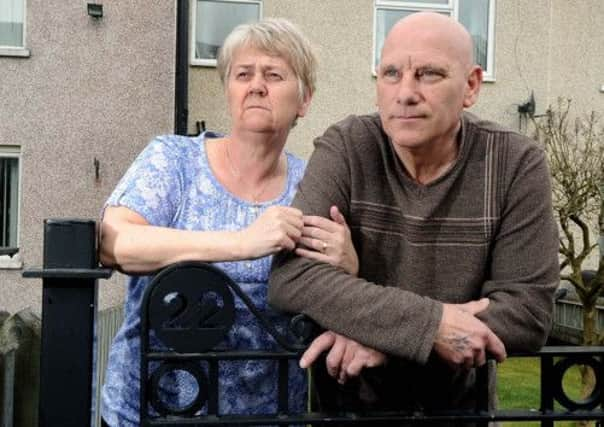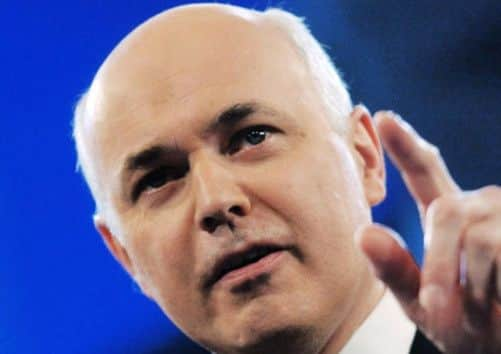Hard choices and uncertain futures... the words of protest at welfare reform


When the Government first announced its radical overhaul of the welfare system, it didn’t take long for criticisms to be aired.
However, when voluntary groups, charities and the individuals likely to be most affected raised concerns they were told to wait.
Advertisement
Hide AdAdvertisement
Hide AdMinisters insisted that the benefit bill had to be cut, but those with a genuine need for help would not be adversely affected.


Many of the most controversial changes were ushered in at the beginning of this month in a bid to save £18bn nationally from the welfare budget by 2015. While some of changes, like the reform of the Disability Living Allowance and a £500 a week cap on the benefits a family can claim, won’t be felt in Yorkshire until later on in the year, benefit restrictions which threaten the living standards of many families across the region are already being felt.
Campaigning groups and opposition MPs have condemned the reforms, which they say will plunge thousands of families and vulnerable people across the country into poverty.
Nearly half a million people have signed the fastest growing petition in history on Change.org calling for Work and Pensions Secretary Iain Duncan Smith to live on £53 in weekly benefits for an entire year, after he claimed he could do so if he needed to on BBC Radio 4’s Today programme.
Advertisement
Hide AdAdvertisement
Hide AdFor Elaine and Philip Ayscough, from Calderdale in West Yorkshire, living on only £114 a week has become a reality because Philip was recently laid off from his job as a labourer. Elaine, 58, who works part time at Halifax Market, says she fears they could be forced out of the three bedroom home they have shared for 37 years because of the so-called “bedroom tax”.
She says she feels the changes made by the Government are unfair.
“If we have to pay an extra £25 per week out of that, we are going to have less than the Government states you need to live on,” she said. “We are just not going to be able to afford it.” The alternative to moving would be for their adult daughters to come back home.
Elaine says they had applied to Calderdale Council for council tax benefit but had not been properly told about the changes – leading to more worries.
Advertisement
Hide AdAdvertisement
Hide AdThe couple raised their children in the family home and Elaine said they felt there should be a “cut off” in the system to protect long-standing residents.
“In reality, we have bought this house over and over again and now we are being more or less thrown out. It’s going to be terrible. We have brilliant neighbours on both sides of us.
“We’re going to have to move into a one bedroom property that will most likely be tiny. But we don’t want to live in a flat.”
Elaine said she and Philip, also 58, were getting older and wanted to have a garden to enjoy.
Advertisement
Hide AdAdvertisement
Hide AdShe said a couple aged 60 across the street were exempt from the housing benefit changes, adding to the sense of unfairness since they were only two years older. Add to this the fact that help had not been offered to find a new home or cover any of the expenses of moving – such as a removal van, new carpets or redecorating.
She said: “On £114 per week, how would we be able to pay for that?”
Campaigner Jak Leith, 46, is a full-time carer and is fighting to limit the impact of the cuts in the Calderdale community.
She said her circumstances could have left her very vulnerable if things had turned out differently.
Advertisement
Hide AdAdvertisement
Hide Ad“I have a large family and I was under-accommodated at the start of my tenancy,” she said. “If I had been allocated the right property initially I would now have two spare bedrooms.”
As part of the campaign in Calderdale, Jak is involved in organising meetings and delivering leaflets.
She said: “On the street I live in now, three families have been affected. We’ve all lived here a long time – 14 years. I know another girl who is in remission from leukaemia and is now suffering again because of this.
“They are all being ousted from their homes, nobody knows where they are going. It’s breaking my heart.”
Advertisement
Hide AdAdvertisement
Hide AdMs Leith said she had seen the community grow up around her, with relationships forming and developing.
“I think there will be a final breakdown in communities,” she said. “People have been crying in the streets to us.”
A report published by The Centre for Regional Economic and Social Research (CRESR) suggested areas in the North of England, Wales and Scotland will be hit much harder by the welfare cuts than in the south.
The report demonstrated that areas of Yorkshire with particularly high levels of deprivation, like Rotherham and Barnsley, will be hit harder by the cuts than more affluent areas such as Harrogate.
Advertisement
Hide AdAdvertisement
Hide AdHull will be hardest hit area, says the report. Hull City Council say they received over 2,000 calls on the first day they opened their special 300 303 hotline for advice on welfare reform changes.
About 5,480 households are set to be affected by the welfare changes in the city, and typical questions to the helpline revolve around the ‘bedroom tax’, emergency credit for gas and electricity bills and requests for information about food banks.
Councillor Stephen Brady, Leader of Hull City Council, said: “We have received a high number of calls, mainly relating to crisis loan payments, worries over money, people affected by welfare reform and changes to the occupancy rules for housing benefit, and staff are working really hard to get through all the different enquiries.
“It is clear there is a lot of concern and our teams are providing advice and information to help people make informed decisions about their circumstances and the next steps they may need to make.”
Advertisement
Hide AdAdvertisement
Hide AdProfessor Steve Fothergill, of Sheffield Hallam University, who co-wrote the CRESR, report said: “There are several benefit reforms going on simultaneously. But broadly speaking, the reforms take money out of the pockets of those who are out of work or who need to claim means-tested benefit.
“In economies where you have high levels of worklessness and high levels of people on benefits, inevitably you are going to get large losses on benefit reforms.
“Welfare reforms are going to widen existing differences in prosperity up and down the country... even within places like Yorkshire you’re going to get widening of the gap.
“I think it is pretty much inevitable that if you are targeting the welfare bill, you are inevitably going to hit the North hard.
Advertisement
Hide AdAdvertisement
Hide Ad“My personal view is the key really should be rebuilding the economy, getting more jobs going, getting people off welfare, not by reducing their benefits, but by making sure there are jobs for them to go to.”
The full impact of the welfare reforms won’t be felt until later on in the year, when the transition from the Disability Living Allowance (DLA) to the Personal Independent Payment (PIP) comes into effect.
Disability charity Scope and think tank Demos estimate up to 3.7 million disabled people will be affected by the cuts nationally.
They also estimate that, due to council budget cuts to social care, 40 per cent of disabled people are already not having basic needs like eating, dressing, washing or getting out of the house met.
Advertisement
Hide AdAdvertisement
Hide AdRichard Hawkes, chief executive of Scope, said: “In 2013 disabled people are already struggling to pay the bills. Living costs are spiralling. Income is flat-lining. We know many are getting into debt, just to pay for essentials.
“What’s the Government’s response? The same group of disabled people face not just one or two cuts to their support, but in some cases three, four, five or even six cuts.
“It paints a frightening picture of the financial struggles affecting disabled people in 2013. On top of this the Government is suggesting capping the welfare bill in the June spending review – having already slashed billions.”
Chancellor George Osborne defended the changes last week, saying the system was “fundamentally broken” . He also attacked criticism of the Government’s plans as “ill-informed rubbish”.
Advertisement
Hide AdAdvertisement
Hide Ad“Those who campaign against a cap on benefits for families who aren’t working are completely out of touch with how the millions of working families, who pay the taxes to fund these benefits, feel about this,” he said.
“Some have said it’s the end of the welfare state. That is shrill, headline-seeking nonsense. I will tell you what is true: taxpayers don’t think the welfare state works properly any more.”